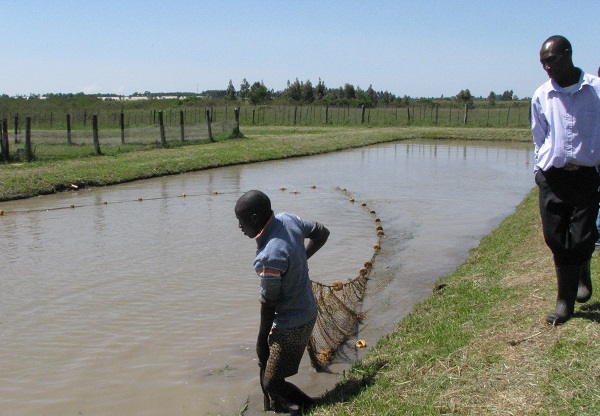FAU’s Harbor Branch to Help Relieve Poverty and Hunger
The saying, “Give a Man a Fish and You Feed Him for a Day. Teach a Man to Fish and You Feed Him for a Lifetime,” aptly describes the partnership between FAU’s Harbor Branch and Aquaculture without Frontiers.

FAU’s Harbor Branch Oceanographic Institute and Aquaculture without Frontiers will work jointly to support and promote responsible and sustainable aquaculture farming to help enhance food security and alleviate poverty and malnutrition in developing and impoverished countries.
The old proverbial saying, “Give a Man a Fish and You Feed Him for a Day. Teach a Man to Fish and You Feed Him for a Lifetime,” aptly describes the newly-formed partnership between FAU’s Harbor Branch Oceanographic Institute (HBOI) and Aquaculture without Frontiers (AwF), a global nonprofit organization. HBOI and AwF will work jointly to support and promote responsible and sustainable aquaculture farming to help enhance food security and alleviate poverty and malnutrition in developing and impoverished countries.
Discussions between HBOI and AwF are under way for the first joint project, which is expected to commence mid-year and will involve a number of countries in Africa. It is expected that the partnership will concentrate efforts on Africa and Latin America in the early stages. Working together, the organizations will advance aquaculture in these developing countries to provide much-needed protein sources as well as economic stimulus through diversification of livelihoods and sustainability of coral reefs that are vital to maintaining healthy ecosystems. The farming of aquatic organisms include fish, mollusks, crustaceans and aquatic plants.
“Facilitating self-sufficiency and sustainability is critical in helping to alleviate hunger and malnutrition worldwide, and we are very excited to join forces with Aquaculture without Frontiers to address this important need,” said Megan Davis, Ph.D., HBOI interim executive director and a leading aquaculture researcher. “Aquaculture is perhaps our best hope to feed our ever-growing global population. As a good source of protein, fish are much more efficient to raise than other leading sources of protein, which require huge amounts of grain and water to grow big enough to eat.”
HBOI has well-established multi-species aquaculture production, nutrition research, and aquatic animal health laboratory infrastructures, and is a world leader in aquaculture research, development, training and education.
“Aquaculture without Frontiers believes that by collaborating and working with like-minded organizations such as Florida Atlantic University, we will be able to make major contributions to the core of our main objectives,” said Roy Palmer, executive director of AwF. “We are very excited about the arrangement and discussions we are having about the future with FAU.”
AwF is a member of the Volunteers for Economic Growth Alliance (VEGA), which is a global network of experienced volunteers who are committed to be a catalyst for change as a means to improve the nutrition and health of people and to foster social and economic development through supporting responsible and sustainable aquaculture. The United States Agency for International Development (USAID) founded VEGA in 2004 to be a procurement partner. More than 10 years later, VEGA stands on its own as a respected non-governmental organization with alliances with other member institutions. AwF believes that aquaculture is critical to underpin the future health of all humans by providing the essential nutrients and vitamins currently missing from many diets, and at an affordable price.
“In addition to the health benefits of fish, aquaculture can contribute to poverty alleviation, food security, and social well-being,” said Marty Riche, Ph.D., HBOI research professor in fish nutrition. “By teaching and training farmers to grow native fish species, to incorporate locally available feed ingredients, to develop and follow bio-security protocols and to reuse fish effluents to irrigate row crops, vegetables, and tree crops, fish farmers can develop truly sustainable farming methods.”
Riche and Paul Wills, Ph.D., HBOI research professor and associate director for research, will be presenting at the AwF Session at Aquaculture 2016 in Las Vegas on Friday, Feb. 26 when further discussions will be held.
According to the Hunger Project, 795 million people, or one in nine people worldwide, do not have enough to eat, and 98 percent of the world’s undernourished people live in developing countries. Seventy-five percent of the world’s poorest people, 1.4 billion women, children and men, live in rural areas and depend on agriculture and related activities for their livelihood. The World Food Programme states that hunger is the No. 1 cause of death in the world, killing more than HIV/AIDS, malaria, and tuberculosis combined.
-FAU-
Tags: community | research | science | harbor branch